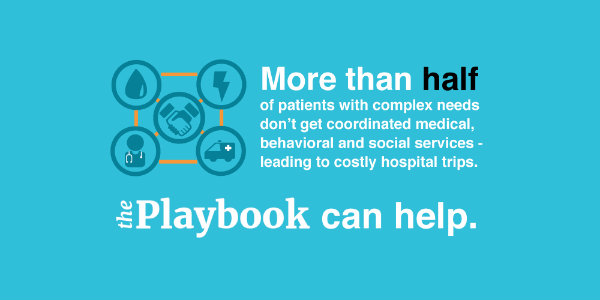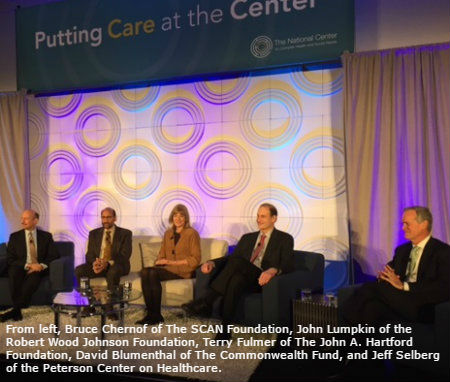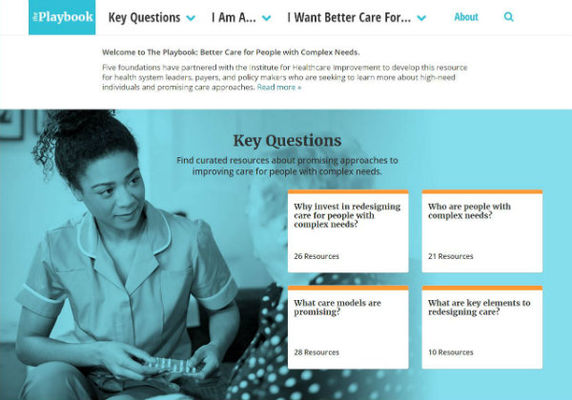Millions of people live, and often suffer, with complex health and social needs that go unmet by our health care system. This includes frail older adults, younger adults with disabilities, people with behavioral health and social needs, and those facing serious illness.
Their experience of poor care is described in a new survey from our colleagues at The Commonwealth Fund, who along with us at The John A. Hartford Foundation, the Peterson Center on Healthcare, the Robert Wood Johnson Foundation, and The SCAN Foundation, have joined forces in a special collaboration focused on our shared commitment to improving care for these populations with complex needs.
As an initial step, we are very pleased to announce the launch of a new online resource—The Playbook: Better Care for People with Complex Needs—that curates information and resources on promising approaches to complex care. It was developed in partnership with the innovative experts at the Institute for Healthcare Improvement.
We are excited to offer the Playbook as a new resource to leaders of Accountable Care Organizations, Medicare Advantage plans, and health care organizations with financial incentives aligned around the quality (as opposed to the quantity) of care delivered to their patient populations. The Playbook brings together in one place methods and tools to identify the patient population at highest risk and highest costs, case studies on promising approaches, guidance on the business case for improving care for patients with complex needs, and information on policy and payment reform opportunities.
Why did we engage in this effort? The John A. Hartford Foundation has worked for three decades to develop and spread effective, affordable models of care for older adults with complex needs that improve their outcomes, and we are now doubling down on creating age-friendly health systems across the country.
Our collaborating partners have similarly invested in innovations, research, and policy action focused on complex care, and we have all seen remarkable advancements. But for each of us, the challenge has been spreading what works on a scale that truly meets the need.
 This Playbook and our ongoing collaboration represent our commitment to work harder than ever to bring together and harness all of our combined strengths—each of our different foundation’s expertise, networks, and innovative ideas—to be more widely accessible and achieve impact on a larger scale.
This Playbook and our ongoing collaboration represent our commitment to work harder than ever to bring together and harness all of our combined strengths—each of our different foundation’s expertise, networks, and innovative ideas—to be more widely accessible and achieve impact on a larger scale.
We believe that working together, and with others in the field, we can magnify the successes in meeting the needs of complex patients currently found in pockets around the country. We believe all of this is possible because of the move toward value-based health care that we have seen gaining traction over the past several years, and which we also believe will continue on its non-partisan track toward being the dominant paradigm in health care delivery.
Of course, we know that compiling all of the best evidence and tools together in one place, like the Playbook, will not be enough to transform care. We will also need to provide practical assistance to health systems so they can implement models and approaches in a way that makes sense for them, while also maximizing the likelihood of getting the desired outcomes. In many ways, these systems need training and coaching that helps them achieve a change in their culture, as much as a change in their electronic health records or protocols.
We also need:
- continued payment and policy change;
- quality measurement systems that reward care that achieves outcomes that really matter to people and their families;
- and to continue to build our knowledge of what works in real-world settings through more applied research.
 This is work we look forward to engaging in with our partners, who are already taking amazing strides in improving complex care. I was so pleased to be with my foundation colleagues last week announcing the release of this Playbook at the inspiring inaugural conference of the National Center for Complex Health and Social Needs funded by the Robert Wood Johnson Foundation, AARP, and The Atlantic Philanthropies and sponsored by the Camden Coalition of Healthcare Providers. It was an energized gathering of passionate people who give me hope that we can make a real difference in the world.
This is work we look forward to engaging in with our partners, who are already taking amazing strides in improving complex care. I was so pleased to be with my foundation colleagues last week announcing the release of this Playbook at the inspiring inaugural conference of the National Center for Complex Health and Social Needs funded by the Robert Wood Johnson Foundation, AARP, and The Atlantic Philanthropies and sponsored by the Camden Coalition of Healthcare Providers. It was an energized gathering of passionate people who give me hope that we can make a real difference in the world.
Redesigning care for patients with complex needs, especially disadvantaged older people who interact frequently with our medical system, will alleviate suffering, decrease costs, and send a message that we are serious about health equity. Working together, we can create age-friendly health systems and scale up solutions that improve outcomes for those in greatest need.

